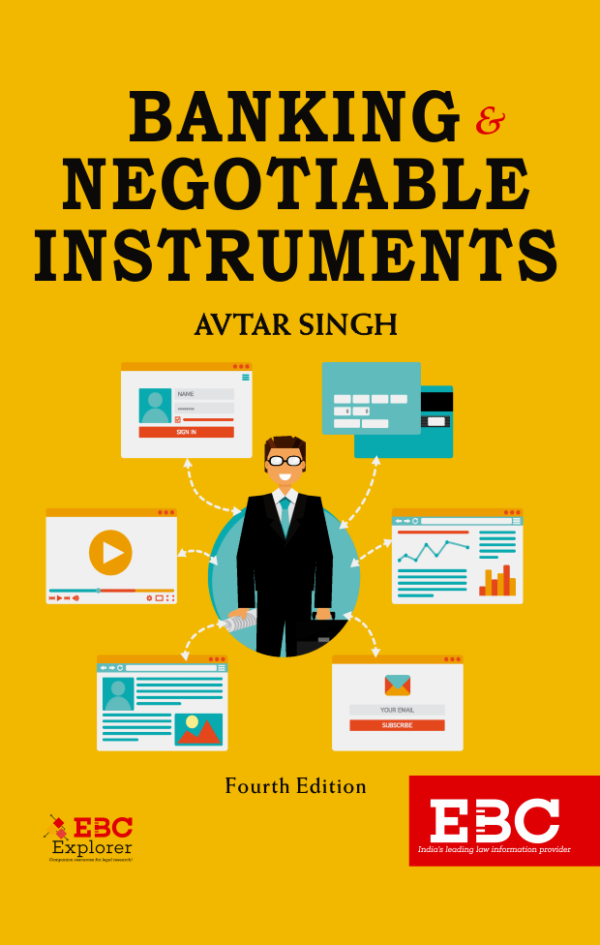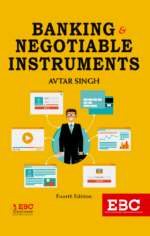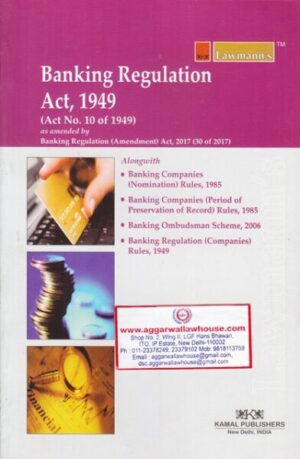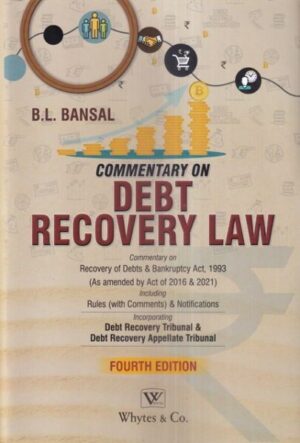EBC Banking & Negotiable Instruments by Avtar Singh Edition 2022
EBC Banking & Negotiable Instruments by Avtar Singh Edition 2022
Description
EBC Banking & Negotiable Instruments by Avtar Singh Edition 2022
EBC Banking & Negotiable Instruments by Avtar Singh Edition 2022
Banking and Negotiable Instruments by Dr. Avtar Singh is a comprehensive book on banking and negotiable instruments. The book is divided into three parts. The first part deals with the law of banking; the second part deals with DRT and SARFAESI, and the third part deals with Negotiable Instruments. The following are the notable features of this edition:
1. Includes a new part on DRT and SARFAESI
2. Includes a separate chapter on Dishonour of Cheques
3. Discusses the Negotiable Instruments (Amendment) Act, 2018
4. Covers the latest rulings of the Supreme Court and High Courts
The book discusses various aspects of recovery of debt through DRT, viz. making application to the tribunal, appeal to the appellate tribunal, pre-deposit provisions, etc. In the SARFAESI Act, provisions of enforcement of security interest, taking possession of the secured asset, etc. have been extensively dealt with. Further, the new chapter on Dishonour of Cheques analyses in depth the jurisdiction issue for an offence of criminal liability for dishonour of cheques.
The book will be of immense use for students of LL.B. and LL.M., bankers, financial institutions and businessmen. The book will prove to be indispensable for students appearing for the General and Specialist Officers exam conducted by the IBPS and bank employees and professionals appearing for the JAIIB/CAIIB examinations conducted by the Indian Institute of Banking & Finance.
Reviews
In this book for the first time the subject of negotiable instruments has been dealt with elaborately covering not only the latest case-law on the subject but also the recent amendments in the law relating to negotiable instruments. For example, this is one of the first commentaries that incorporate the changes introduced by the Amendment Act 55 of 2002. The act has ushered in remarkable changes in its wake. The law relating to dishonour of cheques has been made more stringent and the procedure to be followed by the Courts in such cases has been simplified to enable the speedy disposal of the cases. The limitation period for the issue of notice in such cases has been increased to 30 days from 15 days. The amendment further provides for the issue and acceptance of cheques in electronic form including truncated cheques in electronic image it also provides for digital signatures ans asymmetric crypto system.
The work gives a detailed commentary on the three kinds of negotiable instruments recognised by the Indian Negotiable Instruments Act, 1882, viz., promissory note, bill of exchange and cheque. A comprehensive introduction, discusses the definition of a Negotiable Instrument and the kinds of negotiable instruments, the rights and duties of the parties as well as the legal conditions to complete the negotiable instrument, all explained in an unambiguous language. A large number of cases relating to cheques, including dishonour of cheques, have been discussed.
Another highlight of the book is its simplicity of explanation combined with a style that ensures easy understanding for the reader. The book will surely prove to be indispensable for lawyers, bankers, financial institutions, businessman and students.
Additional information
| Weight | 1 kg |
|---|---|
| Authors | |
| Binding | |
| Language | |
| Publisher | |
| Edition | |
| ISBN |








Rating & Review
There are no reviews yet.